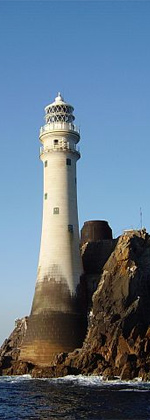Poolbeg Lighthouse
 Poolbeg Lighthouse in 2015 | |
 | |
| Location | Dublin, Ireland |
|---|---|
| Coordinates | 53°20′31.8″N 6°09′04.7″W / 53.342167°N 6.151306°W |
| Constructed | 1767 |
| Construction | granite |
| Tower height | 20 metres (66 ft) |
| Tower shape | cylindrical tower with balcony and lantern |
| Markings | red painted |
| Focal height | 20 metres (66 ft) |
| Characteristic | red light 8 s on, 4 s off, 4 s on, 4 s off |
| NGA no. | 114-6620 |
| Admiralty no. | A5882 |
| ARLHS no. | IRE-057[1] |
Poolbeg Lighthouse is an active aid to navigation at the mouth of the River Liffey, near Poolbeg, Dublin. First established in 1767, it initially operated on candlepower[2] but this was changed to oil in 1786.[2] It was re-designed and re-built into its present form in 1820.[3]
Location[]

The lighthouse, one of a formation of three, is located on the Great South Wall (South Bull Wall), at the Port of Dublin, which extends from Ringsend's Poolbeg peninsula nearly four miles out into Dublin Bay. The wall was the world's longest at the time of its building, and remains one of the longest sea-walls in Europe. One of the other two lighthouses is located on the Bull Wall opposite, and the other on a wooden platform mid-channel.
The Poolbeg Lighthouse is a handsome[citation needed] and conspicuous feature in the bay, in which it occupies an almost central position. It is nearly equidistant from Dublin, Dún Laoghaire, and Howth, and commands extensive views of the shores of the bay, with an unbroken panorama of the mountains on the south. Howth with its heather-clad hills, bright green fields and rugged reaches of sea cliff, is very visible from this point.[4][5]
Original building[]


The lighthouse when originally constructed, presented an entirely different appearance from what it does at the present time. It was not as high as the existing structure, it sloped much more rapidly towards the top, and was surmounted by an octagonal lantern with eight heavy glass windows. A stone staircase with an iron balustrade led to the second storey, where an iron gallery surrounded the whole building.
The alteration to the present form was made in the early part of the nineteenth century.[6]
Management[]
The lighthouse, automated for many years, is managed by Dublin Port Company, whereas most lighthouses in Ireland are managed by the Commissioners of Irish Lights, today part of a larger cross-border body.[1]
Standard height measurement for Ordnance Survey Ireland[]

Historically, the Ordnance Survey Ireland used the low water mark of the spring tide on 8 April 1837 at the Poolbeg Lighthouse as a standard height for all its maps,[7] a practice which continued up until 1958.
Colouring[]

The Poolbeg Lighthouse is painted red. The green lighthouse on the opposite side of the channel is the North Bull lighthouse, a couple of metres off the end of the North Bull Wall, and another green lighthouse the North Bank Lighthouse is also located next to the shipping channel into Dublin. As with all navigational aids marking a channel, the port side as one heads upstream is indicated by red markers whilst the right hand side or starboard of the channel is green.[8]
See also[]
- Lighthouses in Ireland
References[]
- ^ Jump up to: a b Rowlett, Russ. "Lighthouses of Eastern Ireland (Leinster)". The Lighthouse Directory. University of North Carolina at Chapel Hill. Retrieved 1 September 2020.
- ^ Jump up to: a b Cox, Ronald C.; Gould, Michael H. (1998). Ireland. Thomas Telford. pp. 15–16. ISBN 978-0-7277-2627-8.
- ^ Great South Wall - Great South Wall
- ^ History of Poolbeg Yacht, Boat Club & Marina Dublin near South Wall Walk Archived 27 November 2007 at the Wayback Machine
- ^ "RTÉ Radio One, Mooney Goes Wild". RTÉ News.
- ^ Neighbourhood of Dublin: Poolbeg Lighthouse and the South Wall Extension, Irishtown, Sandymount, Beggardbush and Baggotrath
- ^ "Irish Grid Reference System". Ordnance Survey Ireland. Archived from the original on 11 September 2009. Retrieved 22 October 2010.
- ^ "Dublin Port". eOceanic.com. Retrieved 1 September 2020.
External links[]
| Wikimedia Commons has media related to Poolbeg Lighthouse. |
- Lighthouses completed in 1768
- Towers completed in 1768
- Lighthouses completed in 1820
- Lighthouses in the Republic of Ireland
- Dublin Bay
- 1768 establishments in Ireland


